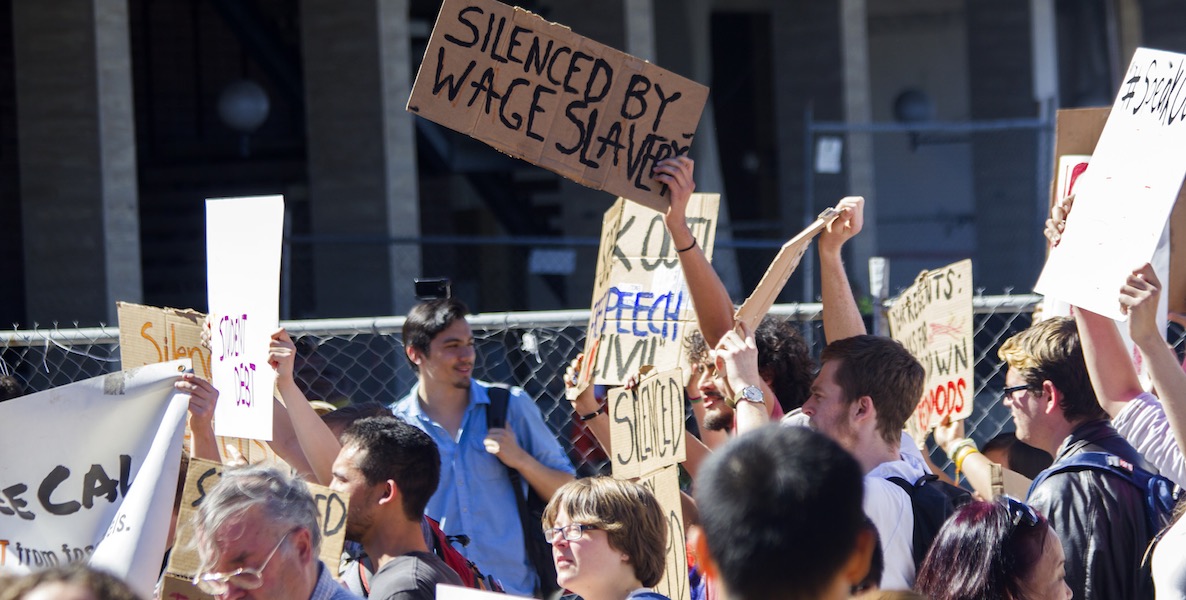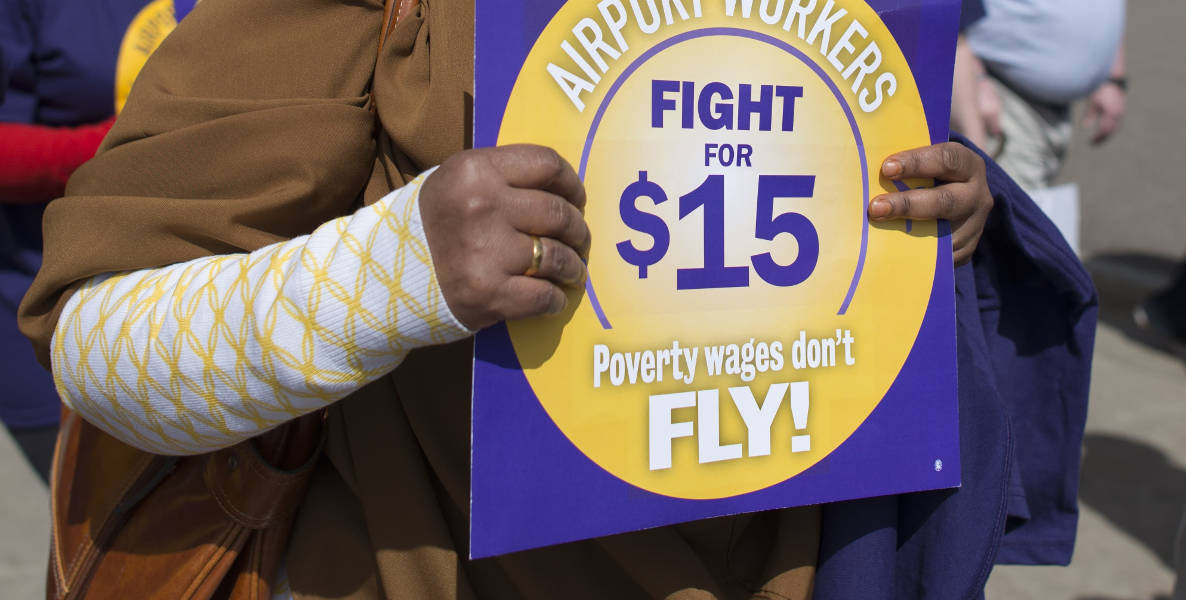It’s taking place throughout Philadelphia and across the country, and many people don’t even know it. Simply put, workers—particularly low wage workers and immigrants—are getting screwed by their employers. Employers are stealing from their employees’ paychecks, skimming off the top, stealing tips, withholding pay, shaving off hours, making illegal deductions, making people work extra hours for free…you name it. It’s called wage theft. And it’s illegal. For those individuals and families who are already struggling to make ends meet, wage theft can cripple them. And because wage theft is so underreported, the practice is more widespread than you would ever imagine.
A number of high-profile cases have helped to bring attention to this growing epidemic. For example, last year 10,000 current and past Chipotle employees filed a class action lawsuit against the restaurant chain, alleging they were made to work off the clock for additional hours without compensation. According to the suit, “Chipotle routinely requires hourly-paid restaurant employees to punch out, and then continue working until they are given permission to leave.” This is the largest wage theft class action in history.
But Chipotle is not alone. Last year, New York Attorney General Eric Schneiderman and the U.S. Department of Labor announced a $500,000 agreement with a Papa John’s franchisee, whose three stores violated minimum wage and overtime laws, and took illegal deductions from 200 workers’ wages by failing to fully reimburse all work-related expenses. McDonald’s was on the hook for tens of millions of dollars a franchisee stole from 500 employees; the franchisee settled for $700,000. And in 2014 the Pennsylvania Supreme Court upheld a $187 million verdict by a Philadelphia jury on behalf of Wal-Mart employees who were owed lost wages from missed paid breaks and off-the-clock work.
Meanwhile, several reports released in recent years have shed light on the scope of wage theft. A 2009 report by the National Employment Law Project and others—Broken Laws, Unprotected Workers: Violation of Employment and Labor Laws in America’s Cities—studied nearly 4,400 low-wage workers in New York City, Los Angeles and Chicago. The study found that 26 percent of workers had been paid below the minimum wage, while 76 percent of those who worked over 40 hours were not paid at the required time-and-a-half overtime rate. And 17 percent of the employees worked “off the clock” either before or after their shifts. Low-wage workers in these three cities lost an estimated $56.4 million each week, with the average worker losing $2,634 out of $17,616 in total earnings. The total wage theft from these three cities was close to $3 billion.
“Employers do threaten calling immigration on their workers,” says Nadia Hewka, staff attorney at Community Legal Services of Philadelphia. “There are literally direct threats against my clients, when all they try to do is get their wages.”
A 2014 report from the Economic Policy Institute estimated that wage theft costs workers more than $50 billion annually. “All of the robberies, burglaries, larcenies, and motor vehicle thefts in the nation cost their victims less than $14 billion in 2012, according to the FBI’s Uniform Crime Reports. That is well over one-third of the estimated cost of wage theft nationwide,” the report said.
Locally, the Sheller Center for Social Justice at the Temple University Beasley School of Law issued a report in 2015 on wage theft in Pennsylvania. The report discussed the various types of wage theft, including minimum wage violations, overtime violations, illegal deductions from a worker’s paycheck, undercounting of hours worked, and delayed or missed payments. The authors estimate that in a given workweek, 397,673 low-wage Pennsylvania workers experience a minimum wage violation, while 326,647 workers experience an overtime violation, and 257,204 workers are not paid for off-the-clock work before and after their shift. In the five counties of the Philadelphia metropolitan area, those numbers are 128,476 minimum wage violations, 105,458 overtime violations, and 83,344 of-the-clock violations. These workers lose 15 percent of their earnings due to wage theft, leading their families to make tough decisions, “such as whether to forego purchasing food or face the consequences of unpaid bills for housing, utilities, and health care.”
A sampling of occupations tells the real story. For example, an estimated 49 percent of beauty, dry cleaning and general repair workers and 66.3 percent of childcare workers in Pennsylvania are victims of minimum wage violations in a given week. In addition, 67.8 percent of cooks, dishwashers and food preparers and 86 percent of stock office clerks and couriers are denied overtime pay, and 72.5 percent of building services and grounds workers and 90.4 percent of home healthcare workers face off-the-clock wage violations.
Further, the report concluded that stolen wages deprive the state of tens of millions of dollars in tax revenue each year, and places law abiding businesses at a competitive disadvantage.
“I think the hardest thing about the whole issue is we know that it happens frequently, but it is completely under reported for a huge variety of reasons,” says Jennifer J. Lee, assistant clinical professor of law at Temple University Beasley School of Law. Lee heads the Social Justice Lawyering Clinic at the Sheller Center, where she works with law students assisting low-income people, especially low-income workers and immigrants. “The underreporting happens because of fear of retaliation, that makes a lot of sense,” Lee noted, adding that while wage theft occurs across the spectrum, it is pronounced in lower paying jobs, as “people in tenuous low wage jobs don’t want to jeopardize their jobs because of balance of power issues. And if you’re someone who doesn’t have immigration status or has tenuous immigration status, it isn’t just being fired, but being deported.” Typically, some employers will seek out immigrant workers for exploitation, on the belief they will not complain about bad working conditions.

Get More From Every Story
We include boxes in nearly every story to help you take action. Click the boxes below to see how you can make Philly better.
“Clearly wage theft is a problem for people living paycheck to paycheck when you can’t pay your bills and your rent, and you’re struggling,” says Nadia Hewka, staff attorney at Community Legal Services of Philadelphia. “It appears wage theft is a bigger problem than all kinds of other theft and property crimes combined. It’s staggering when you think about it, because you know how many people get swept up in petty crimes, and we know it is unreported because we have situations where only one or two people step forward.”
According to Hewka, the most common wage theft culprits include small mom and pop pizza places, small restaurants, green grocers and delis, home healthcare and childcare, and low wage, unregulated environments where there is no union in place and no one to monitor the employer’s activities.
Wage theft costs workers more than $50 billion annually. According to a 2014 study by the Economic Policy Institute, “all of the robberies, burglaries, larcenies, and motor vehicle thefts in the nation cost their victims less than $14 billion in 2012, according to the FBI’s Uniform Crime Reports. That is well over one-third of the estimated cost of wage theft nationwide.”
Another form of wage theft, Hewka notes, occurs when workers are misclassified as independent contractors, as is the case with 9 percent of Pennsylvania workers. Further, in the age of the “fissured workplace,” there is distance between workers and their employers. Temp agencies and subcontractors come in to insulate the employer, creating uncertainty as to who writes the paychecks and who takes ultimate responsibility for workplace health and safety, “and everyone leans on the guy above them when they’re not paid.” Lee noted a number of cases where employers unsuccessfully claimed their workers were independent contractors, including workers folding laundry in a laundromat, and employees on a construction site working as a subcontractor to a larger contractor.
Fortunately, there are solutions to wage theft. For example, the Sheller Center report recommended stronger penalties for employers; increasing funding to the Department of Licenses and Inspections (DLI) for enforcement of wage and hour laws; working with community groups to determine enforcement priorities, and the use of license revocations and wage liens for employers. Meanwhile, Philadelphia enacted a wage theft ordinance last year, allowing employees to file wage theft complaints with the City of Philadelphia’s Wage Theft Coordinator. Experts believe it is too soon to assess the implementation of the ordinance and its impact.
Hewka believes the enforcement of wage laws is important, but must be strategic and focus on certain industries where wage theft occurs. In addition, she says it is important for agencies to take anti-retaliation seriously. And she is concerned that under a Trump administration, immigrant workers will be concerned about coming forward. “Employers do threaten calling immigration on their workers. There are literally direct threats against my clients, when all they try to do is get their wages,” she says. Further, Hewka emphasizes the need to devote resources in other parts of the state for similarly situated workers.
“We need a forum for workers to organize, more unionization of workers. Workers organizing more informally through workers’ centers,” Lee says. “That is crucial to overcoming that imbalance of power.” Lee adds that while enforcement is important, enforcement alone will not work, particularly if resources are limited. “We need to make consumers more aware of what is going on,” she noted, using the example of the Restaurant Opportunities Center (ROC) “High Road” Diner’s Guide to Ethical Eating, which highlights restaurants with the highest wage and labor standards. “People in Philadelphia are incredibly progressive, and if they know there is a list of restaurants that don’t pay their workers, they would respond.”
Header photo by Quinn Dombrowski on Flickr





